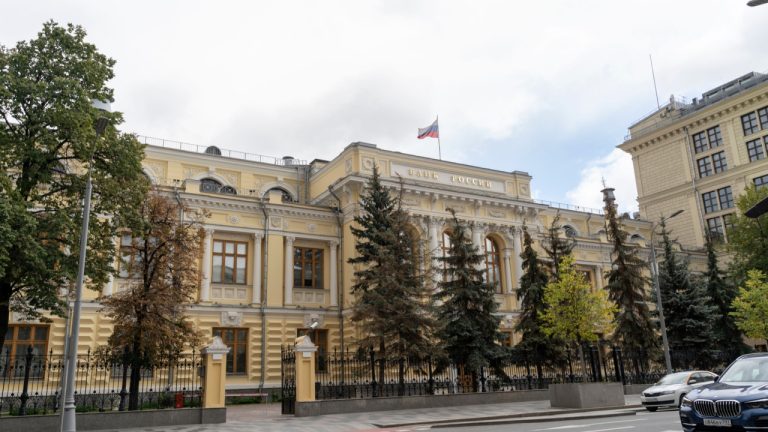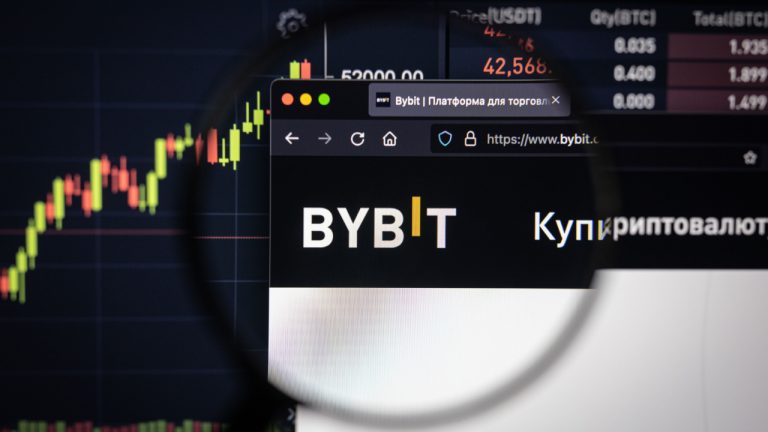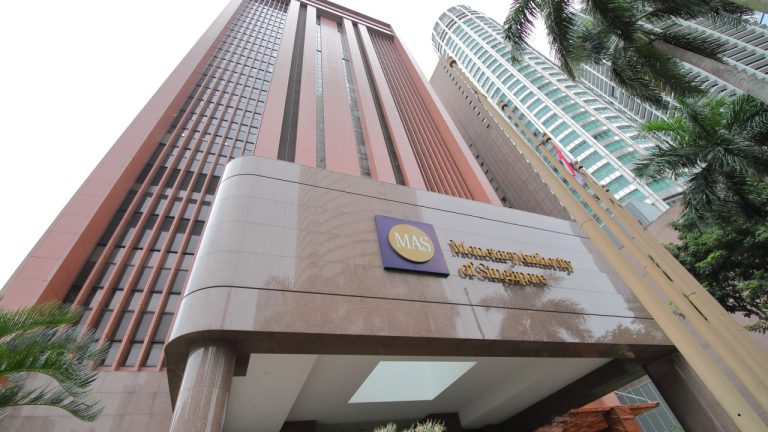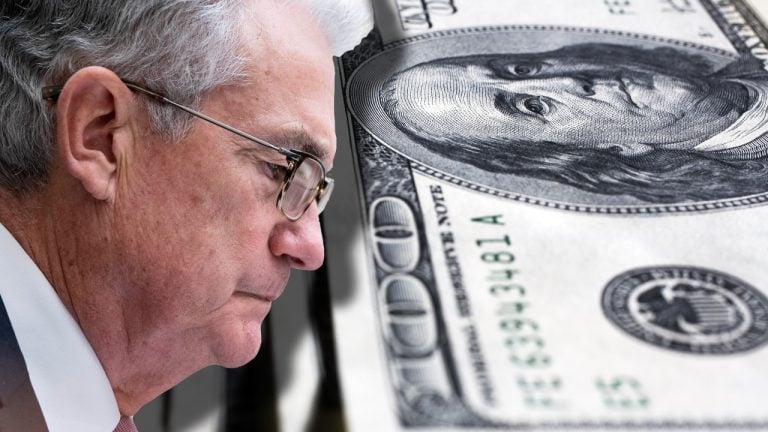 The Central Bank of Russia is proposing to introduce tax incentives for long-term holders of digital financial assets. The idea has been circulated with a consultation paper published for public discussions on the development of the digital asset market in the Russian Federation. Bank of Russia Talks Regulation in New Report Devoted to Digital Assets […]
The Central Bank of Russia is proposing to introduce tax incentives for long-term holders of digital financial assets. The idea has been circulated with a consultation paper published for public discussions on the development of the digital asset market in the Russian Federation. Bank of Russia Talks Regulation in New Report Devoted to Digital Assets […]
The U.S.-China tensions, the Russia-Ukraine war, higher energy prices, rising inflation, the COVID-19 pandemic and cyberattacks came out as some of the most pressing financial risk concerns.
While proponents of traditional finance remain keen on dismissing Bitcoin (BTC) and the crypto ecosystem as financial risks, a survey conducted by the Federal Reserve Bank of New York — one of the 12 federal reserve banks of the United States — revealed 11 factors that overshadow crypto in terms of risk in 2022.
Geopolitical tensions, foreign divestments, COVID-19 and high energy prices were found to be some of the most-cited potential risks for the US economy, according to a central bank survey published by the Federal Reserve System.

Out of the 14 factors that pose a financial risk, crypto stands at the 11th position — revealing a change in investor mindset owing to the continued efforts of crypto entrepreneurs to educate the masses.
Some of the pressing risk concerns raised by the respondents were related to the power struggle of global economies, which includes the U.S.-China tensions, the Russia-Ukraine war, higher energy prices, rising inflation, the COVID-19 pandemic and cyberattacks, to name a few.
However, the U.S central maintains its anti-cryptoposition when it comes to evaluating the risks in crypto investment. It pointed out in the report that selected cryptocurrencies — including BTC, Ether (ETH), Binance Coin (BNB), Cardano (ADA) and XRP — are down about 69 percent in value compared to the Nov. 2021 peak, adding that:
“Speculation and risk appetite appear to be the primary driving forces of crypto-asset prices, which have recorded big swings in recent years.”
The central bank also cited the collapse of the Terra (LUNA) ecosystem, highlighting that entities that had direct exposure to the in-house stable TerraUSD (UST) found themselves in financial distress, sometimes leading to bankruptcy.”
Related: Joe Biden unhappy with Elon Musk for buying a platform that “spews lies”
On the other side of the world, India launched its home-grown central bank digital currency (CBDC) for the wholesale segment.
While the country is still opposed to the idea of mainstreaming cryptocurrencies, the pilot project saw the involvement of nine local traditional banks, which include the State Bank of India, Bank of Baroda, Union Bank of India, HDFC Bank, ICICI Bank, Kotak Mahindra Bank, Yes Bank, IDFC First Bank and HSBC.
Related reports suggested that India’s central bank — the Reserve Bank of India (RBI) — plans to launch the digital rupee for the retail segment within a month in select locations.
 Cryptocurrency exchange Bybit has no intention to introduce restrictions for Russian traders, despite a recent reminder by the Monetary Authority of Singapore (MAS) about the obligations of crypto providers in that respect. According to a crypto media report, the platform shared its position in correspondence with partners. Bybit Reportedly Vows to ‘Not Discriminate Against Crypto […]
Cryptocurrency exchange Bybit has no intention to introduce restrictions for Russian traders, despite a recent reminder by the Monetary Authority of Singapore (MAS) about the obligations of crypto providers in that respect. According to a crypto media report, the platform shared its position in correspondence with partners. Bybit Reportedly Vows to ‘Not Discriminate Against Crypto […]
Richard Werner discusses decentralization's challenges and blockchain's role in it in an exclusive interview with Cointelegraph.
CBDCs are a declaration of war against the banking system, Richard Werner — development economist and professor at De Montfort University — told Cointelegraph at Web Summit on Nov. 4.
Known for his quantitative easing theory, published almost 30 years ago, Werner is an advocate for a decentralized economy. In an exclusive interview with Cointelegraph's editor-in-chief Kristina Lucrezia Cornèr, he discussed the challenges that surround decentralization, the role of central banks, and how blockchain can help promote transparency in economies.
This interview was part of Cointelegraph's extensive coverage at Web Summit in Lisbon — one of the world’s leading tech conferences.
Cointelegraph: Do you think that a decentralized financial system is actually possible?
Richard Werner: Yes, because of course what we have is lots of forces for centralization by the central players. They love that, and they want more centralization, but that's very dangerous and very bad. The extreme case is the Soviet Union, through key periods that was a very centralized monetary system with only one central bank, and that wasn't a good system. But that's what the central planners in other countries like the ECB [European Central Bank], that's what they want.
The ECB says there are too many banks in Europe. Why is that? And who are they to say that? Well, they'd love it to be only them. They don't want competition. They want to be back to the central bank, the only central bank. So, that's where the issuance of CBDC's comes in because through CBDC's the central planners are thinking it's a declaration of war against the banking system. CBDC is really literally the central bank saying we're going to open current accounts, ordinary banking for the ordinary public at the central bank. In other words, the bank regulator is suddenly saying we're going to compete against the banks now because the banks have no chance. You can't compete against the regulator.
CT: And is decentralization possible in this scenario?
RW: Yes, it is, but only if we create many local community banks, proper full-blown banks with a banking license because a banking license is a license to print money, literally. When a bank gives a loan, you know where that money comes from for the loan? It doesn't come from deposits. That's just breakers of what the bank owes you the money for. The new loan is newly created by the bank and added to the money supply, and that's allowed when you have a banking license.
A banking license is a license to print money, and if we have many community banks, that is a decentralized system. They lend only locally to the local area, local small firms. That's productive lending, that's sustainable, non-inflationary. Then you get growth and prosperity, employment, job creation, stability, no inflation. But when you get a centralized system and bigger banks, they buy up the small banks, or you only have one central bank.
They also want to do only big deals. The bigger banks get, the bigger the deals they want to do, but big deals are usually asset lending where the bank creates money. People buy assets, which creates asset inflation and the asset bubble. That's why we have them. And then you get a banking crisis because it's always, you know, dependent on money creation continuing.
CT: What is the role of blockchain here?
RW: It does usually mean the potential for decentralization by definition because it is a distributed ledger. Why? Where does this expression come from on distributed ledger? The ledger is the account double entry, accounting, asset liability, the balance sheet of a company and a bank.
The standard system is a centralized ledger held by the central bank and then the banks. Because the more banks you have, the more decentralization you already have, but a totally decentralized ledger is where everyone can check using the technology for transactions. You have this post and check and, therefore, accountability. That's why it's an interesting tool. It gives this transparency and local accountability if it's used in the right way. I think, once again, it's an ideal combination of blockchains and combining it with local banking because then you maximize service.
 The Monetary Authority of Singapore (MAS) has reiterated that cryptocurrency exchanges need to conform to restrictions on Russian users imposed over Moscow’s invasion of Ukraine. The reminder comes after researchers established that pro-Russia activists have raised millions of dollars in digital assets to support its war effort. Singapore Says Measures Targeting Russia Apply to All […]
The Monetary Authority of Singapore (MAS) has reiterated that cryptocurrency exchanges need to conform to restrictions on Russian users imposed over Moscow’s invasion of Ukraine. The reminder comes after researchers established that pro-Russia activists have raised millions of dollars in digital assets to support its war effort. Singapore Says Measures Targeting Russia Apply to All […] The U.S. Federal Reserve introduced another jumbo rate hike on Wednesday, Nov. 2, 2022, by hiking the federal funds rate (FFR) by 75 basis points (bps). The American central bank said on Wednesday that the hike aims to curb inflation and the Fed says “recent indicators point to modest growth in spending and production.” U.S. […]
The U.S. Federal Reserve introduced another jumbo rate hike on Wednesday, Nov. 2, 2022, by hiking the federal funds rate (FFR) by 75 basis points (bps). The American central bank said on Wednesday that the hike aims to curb inflation and the Fed says “recent indicators point to modest growth in spending and production.” U.S. […]
UnionBank, one of the largest universal banks in the Philippines, debuts cryptocurrency trading via a partnership with a Swiss crypto firm.
The Union Bank of the Philippines (UnionBank), one of the largest universal banks in the Philippines, debuts cryptocurrency trading via a partnership with a Swiss crypto firm.
UnionBank has launched a pilot program for Bitcoin (BTC) and Ether (ETH) custody and trading services for select retail customers, the firm said in a joint announcement on Nov. 2.
The new investment and trading feature launches in collaboration with the Swiss crypto technology firm Metaco, with UnionBank going live on Metaco’s digital asset platform Harmonize. UnionBank initially partnered with Metaco for the development of crypto trading services in January 2022.
Licensed and supervised by the Philippines’ central bank, Bangko Sentral ng Pilipinas (BSP), UnionBank has been actively exploring the crypto industry in recent years. In 2019, UnionBank launched a payments-focused stablecoin pegged to the Philippine peso.
Henry Aguda, chief technology officer and chief transformation officer at UnionBank, said that Metaco has been critical in the bank’s goal to provide “customer-centric” services in the Philippines. He also noted that UnionBank is among the early regulated adopters of crypto in the country, stating:
“We are proud to continue UnionBank’s series of industry firsts, this time being the first regulated bank in the country allowing digital currency exchange features for clients.”
The news comes shortly after Philippines President Ferdinand Marcos highlighted the importance of adopting blockchain technology to master digital banking and digital transactions.
Related: Basel Committee: Banks worldwide reportedly own 9.4 billion euros in crypto assets
In an official presidential speech published in September 2022, Marcos referred to several related milestones by UnionBank, stating:
“The track record of UnionBank in creating opportunities through innovation and digital solutions in the banking sector is uncontested.”
Previously, BSP also warned the public against using non-local crypto trading platforms, stressing that dealing with foreign virtual asset service providers poses challenges in enforcing consumer protection. As of August, there were 19 registered VASPs in the Philippines.

Major Asian financial institution DBS Bank has applied DeFi technology for a project backed by the Monetary Authority of Singapore.
DBS Bank, a major financial services group in Asia, is applying decentralized finance (DeFi) for a project backed by Singapore’s central bank.
DBS has started a trading test of foreign exchange (FX) and government securities using permissioned, or private, DeFi liquidity pools, the firm announced on Nov. 2.
The development is part of Project Guardian, a collaborative cross-industry effort pioneered by the Monetary Authority of Singapore (MAS). Conducted on a public blockchain, the trade included the purchase and sale of tokenized Singapore government securities (SGS), the Singapore dollar (SGD), Japanese government bonds and the Japanese yen (JPY).
The project has shown that trading on a private DeFi protocol enables simultaneous operations of instant trading, settlement, clearing and custody. The initiative could potentially transform the existing trading processes by providing better liquidity across multiple financial assets and markets, DBS said.
According to DBS’ head of strategy Han Kwee Juan, the latest Project Guardian developments lay the foundations for building global institutional liquidity pools enabling faster trading, greater transparency, lower settlement risks and other benefits. Han noted that smart contracts show a lot of promise for trading execution and verification, stating:
“Smart contracts will reshape how execution can be achieved in a highly trusted manner, especially if it takes place in a permissioned market where all anonymous wallets are verified by trust anchors such as Know Your Customer processes.”
Han also pointed out that a highly liquid market attracts more investors and adds efficiency by bypassing intermediaries. “Currently, FX and government securities are primarily transacted in the over-the-counter markets involving multiple intermediaries resulting in friction in the settlement process,” he added.
Related: Singapore's MAS proposes banning cryptocurrency credits
DBS Bank made a massive move into the crypto industry in recent years, launching an institutional cryptocurrency exchange in December 2020. The company has also been working to expand its crypto trading platform to retail investors.
The latest milestone in Project Guardian is yet another example of the growing trend involving a combination of DeFi technology with centralized finance tools. According to Swiss central bank official Thomas Moser, DeFi can work well with central bank digital currencies, complementing each other in terms of stability and liquidity.

As a development bank for El Salvador, BANDESAL created a $150 million trust fund to guarantee the convertibility to dollars for citizens and merchants.
Ever since El Salvador legalized Bitcoin (BTC) as mainstream tender, President Nayib Bukele used Twitter on numerous occasions to announce the country’s BTC acquisitions. However, ALAC El Salvador — a non-governmental anti-corruption bureau — was recently denied information from a state development bank, BANDESAL, regarding El Salvador’s Bitcoin purchases and sales.
As a development bank for El Salvador, BANDESAL created a $150 million trust fund to guarantee the convertibility to dollars for citizens and merchants. The request for disclosure of El Salvador’s Bitcoin acquisition was denied on the grounds of confidentiality.

ALAC El Salvador refuted the denial by highlighting that the BTC purchases were made using public funds. Their official statement translated to:
“The confidentiality limits the possibility for citizens to access and receive information on the operations carried out with public funds by BANDESAL.”
In its refusal statement, BANDESAL said that no information related to the Bitcoin Trust (FIDEBITCOIN) could be shared by the trustee or its board of directors to safeguard national interests.
Publicly available information hints that El Salvador purchased 2,301 BTC to date, which has fallen in value over the past year from $103.9 million to roughly $45 million.
Related: Pro-crypto city of Lugano and El Salvador sign economic agreement based on adoption
Adding on to the country’s piling pressure to suffice its year-long Bitcoin purchases, Spain took over El Salvador’s spot to become the third-largest crypto ATM hub in the world.
El Salvador attained the third spot after installing 205 ATMs to support the country’s thriving Bitcoin economy, amounting to a network of 212 crypto ATMs. However, Spain recently recorded 215 active ATMs, representing 14.65% of European installations.
 The central bank of Thailand is not going to rush with the launch of its digital currency as it’s not yet sure about the benefits it would bring. According to the head of the monetary authority, the development of the state-issued coin may take several years. Thailand’s Central Bank Wants to Better Understand Risks of […]
The central bank of Thailand is not going to rush with the launch of its digital currency as it’s not yet sure about the benefits it would bring. According to the head of the monetary authority, the development of the state-issued coin may take several years. Thailand’s Central Bank Wants to Better Understand Risks of […]